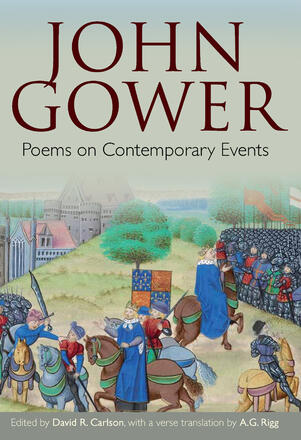
Poems on Contemporary Events
The Visio Anglie (1381) and Cronica tripertita (1400)
Description
The English poet John Gower (ca. 1330-1408) wrote important Latin poems witnessing the two crucial political events of his day: the Peasants' Revolt of 1381 and in 1399 the deposition of Richard II, in the Visio Anglie (A Vision of England) and Cronica tripertita (A Chronicle in Three Parts), respectively. Both poems, usually transmitted with Gower's major Latin work, Vox clamantis, are key primary sources for the historical record, as well as marking culminating points in the development of English literature. The earlier Visio Anglie is verbally derivative of numerous, varied sources, by way of its literary allusions, but is also highly original in its invention and disposition. On the other hand, the Cronica tripertita's organization, even in details, is highly derivative, and from a single source, but its verbal texture is all invented. This volume includes Latin texts of these poems of Gower, newly established from the manuscripts, with commentary on Gower's relation with the rest of the contemporary historical record and with his literary forebears and contemporaries, including Ovid, Virgil, Peter Riga, Nigel Witeker, and Godfrey of Viterbo. This volume also includes Modern English verse translations of the two poems, which are at once critically accurate and enjoyably accessible.
Reviews
Poems on Contemporary Events offers a superb edition and translation of materials that are profoundly important for all students of late fourteenth-century English literature and culture. The Visio Anglie and the Cronica tripertita represent Gower's most topically and poetically interesting Latin verse, and Carlson and Rigg present them here with scholarly rigor and literary elegance. The shrewd introduction and detailed notes along with an accurate and stylish verse translation make this an essential and pleasing resource for those studying Gower's literary career, as well as for those studying literary representations of the period's most notable social and political rebellions. - Andrew Galloway, Professor of English and Medieval Studies, Cornell University